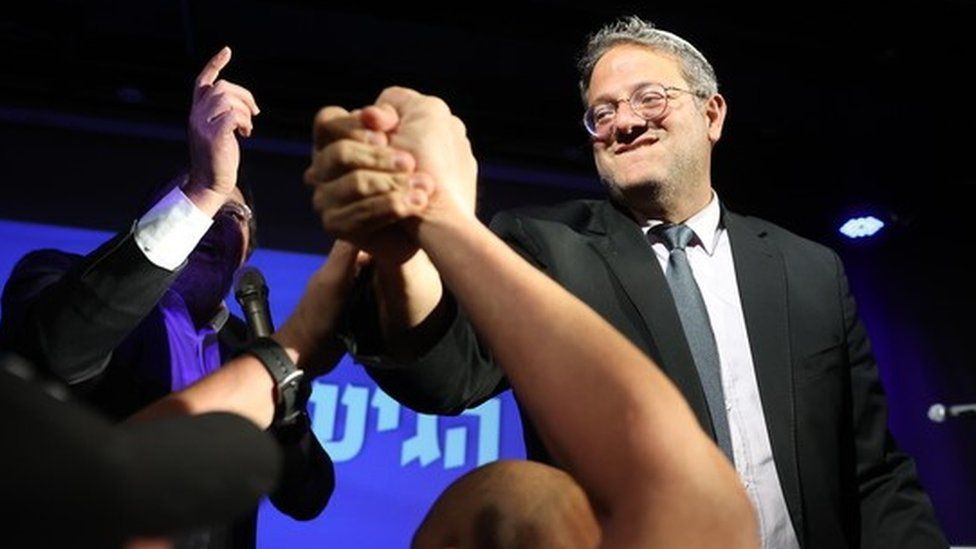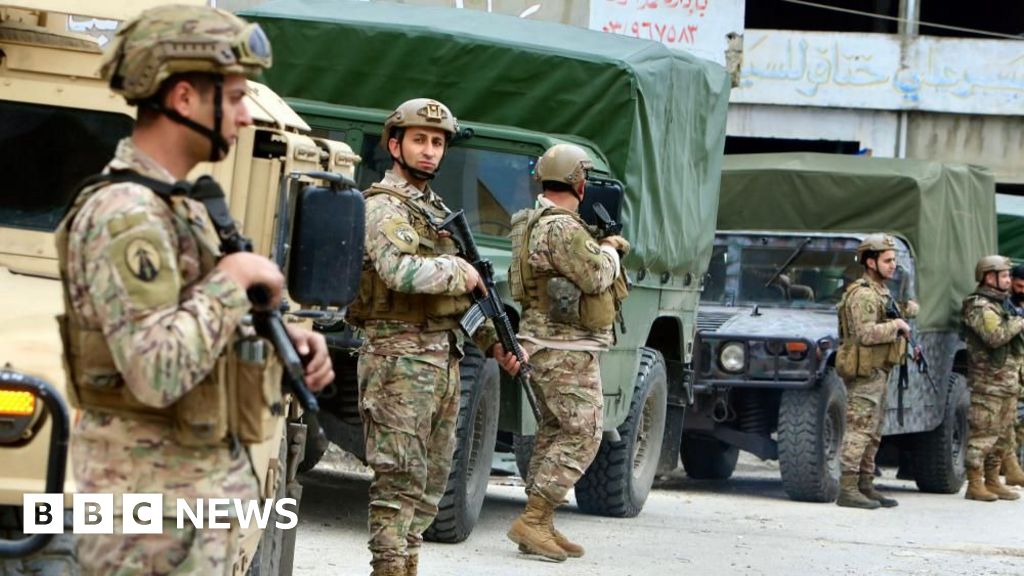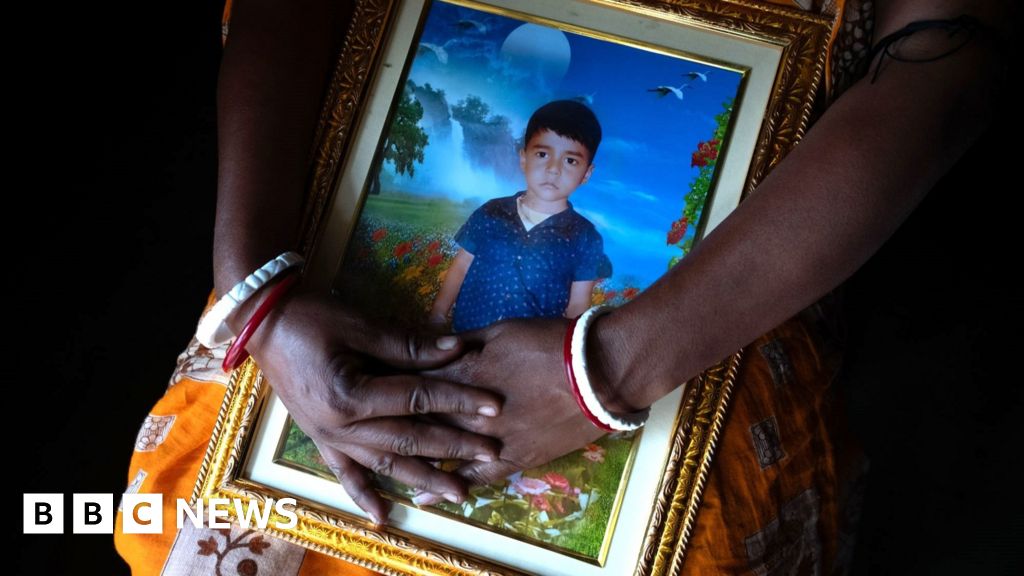ARTICLE AD BOX
 Image source, EPA-EFE
Image source, EPA-EFE
Itamar Ben-Gvir is on course to win a large number of seats, according to polls
By Tom Bateman
BBC News, Jerusalem
Kept well away from the smoke and stun grenades in a flashpoint neighbourhood of occupied East Jerusalem, he pulled out his pistol and called for Palestinians who threw stones to be shot by police.
Itamar Ben-Gvir's shouts came as he was shuffled behind a lorry by his parliamentary security team, one armed with a machine gun.
The ultranationalist Israeli MP is often found wherever tensions flare - pouring on fuel, say his critics - in this case Jerusalem's Sheikh Jarrah where Palestinians have long faced threats of eviction to make way for Jewish settlers.
"I'll mow you down," he shouted later. "We're the landlords here, remember that, I am your landlord."
Now Mr Ben Gvir is captivating an army of young voters who are putting their faith in Israel's extreme right wing. He offers them a tantalising hit of national-religious identity politics plus a possible part in power, while his many detractors fear the rise of a demagogue about to be handed a prized seat in government.
Image source, Reuters
Image caption,Benjamin Netanyahu may depend on the far right to bolster his chances
In Tuesday's election - Israel's fifth in four years - polls suggest his Religious Zionism alliance could come as high as third place and take a decisive role in the potential outcome.
If opposition leader Benjamin Netanyahu can scrape a victory for his religious-right wing bloc, Mr Ben-Gvir would likely be made a senior coalition minister.
The race has seen Mr Ben-Gvir agitate on issues of security during a year of violence in which at least 170 Palestinians and more than 20 Israelis have been killed.
But the growing appeal of his Jewish Power party - one part of the alliance of extreme-right groups - has as much to do with a new generation of voters who see him as the "anti-system" politician, according to the polling expert Prof Tamar Hermann from the Israel Democracy Institute.
"He gives them a voice… he doesn't blink, he's not trying to wrap his ideas in sweet words or to appeal to more sophisticated or moderate audiences. To some people this is the preferred perfume," she told the BBC.
Mr Ben-Gvir is the ideological heir of a racist, fringe movement whose founder was banned by the Israeli authorities from running in elections in the 1980s.
He says he wants to expel "disloyal" Arabs and would establish a ministry for encouraged emigration of "enemy" Palestinian citizens of Israel.
'Set the country alight'
At a campaign rally of his supporters this week, security guards pushed back a crowd of religious young men trying to mob their hero as chants of "Ben-Gvir, Ben-Gvir" broke out.
The politician danced in circles holding his activists' hands and the crowd's devoted attention.
"A few months ago we started to save the state of Israel," he shouted from the rally podium. "You deserve a different reality!"
Image source, Reuters
Image caption,Rising tensions with Palestinians has fuelled support for the Israeli right
The growth of the extreme-right alliance - publicly dominated by Mr Ben-Gvir but led by Bazalel Smotrich, another far-right figure - has created a campaign focus for members of Israel's current ruling coalition.
A campaign video by Minister of Defence Benny Gantz calls the pair pyromaniacs and warns that Mr Ben-Gvir will "set the country on fire".
The advert says he is aiming to be minister of internal security despite never having served in the army.
Aged 18, Mr Ben-Gvir was disqualified from national military service due to his involvement with extremist groups. Later, in 2007, he was convicted of supporting a terror organisation and inciting racism during a protest.
'Fateful' point
The extreme right also has practical benefits for Mr Netanyahu, according to his rivals. They claim he needs the parties onboard as they are proposing laws which would weaken judges' independence and water down corruption rules if they get into the coalition.
Members of the current government believe this would help Mr Netanyahu swerve his ongoing trial for alleged bribery and other charges. Mr Netanyahu denies the allegations and claims any future changes in the law would not affect his trial.
Israel's government, led by the centrist Yair Lapid, is fighting for its survival after little more than a year in office.
It boasted Israel's most diverse ever coalition - including for the first time an independent Arab Israeli party. However, largely united only by its desire to keep Mr Netanyahu from office, it has lacked ideological coherence and finally collapsed during the summer.
One veteran observer of Israeli politics believes Tuesday's election brings the country to a "fateful" point.
"[Ben-Gvir and Smotrich] want to change the type of democracy we have in Israel, they want to take us into a potential dark moment," says Yaakov Katz, editor of the Jerusalem Post in an interview with the BBC.
"They would have the power and the influence to dramatically change the country and that's what they openly say they want to do; when it comes to Jewish relations with Arabs, when it comes to LGBTQ rights, when it comes to the rights of women… they could do a lot of damage." he says.
Meanwhile, the Islamist party Raam which last year became part of the coalition government, is urging its own supporters to vote, warning of the flourishing far right.
Image source, Getty Images
Image caption,The turnout among Israeli Arab voters could influence the result
The party is hovering close to the electoral wipeout zone under Israel's vote-counting rules, according to some polls.
There are concerns turnout will slump among the fifth of Israel's population that is Palestinian by heritage and Israeli by citizenship.
Speaking to the BBC during a campaign rally, party leader Mansour Abbas accused Mr Netanyahu of caving into extremism to make his comeback: "[He] is flanked by Smotrich and Ben-Gvir with racist and fascist attitudes," he said.
In turn, Mr Abbas is often accused by the political right wing of being in-hoc to religious extremists, which he rejects, and is also called out over his party's stance against LGBTQ rights.
Some observers have noted an attempt by Mr Ben-Gvir to sanitise his image in public since he was first elected as an MP in March 2021. He was filmed telling a supporter not to chant "Death to Arabs" but instead "Death to terrorists".
Challenged by the BBC outside his campaign rally over why he called for the expulsion of "disloyal" Palestinian citizens of Israel, Mr Ben-Gvir said: "Listen, I don't want to expel all the Arabs, just the jihadists."
The polls currently suggest a tie between the two main parliamentary blocs - with Mr Netanyahu edging ahead.
As with previous elections the outcome is far from certain and - although unlikely - the former PM could also try to lure back former defectors to try to build a different composition of coalition.
But for now Israel's race to break its election deadlock sees a battle over how far the extreme right will reach.

 2 years ago
17
2 years ago
17








 English (US) ·
English (US) ·